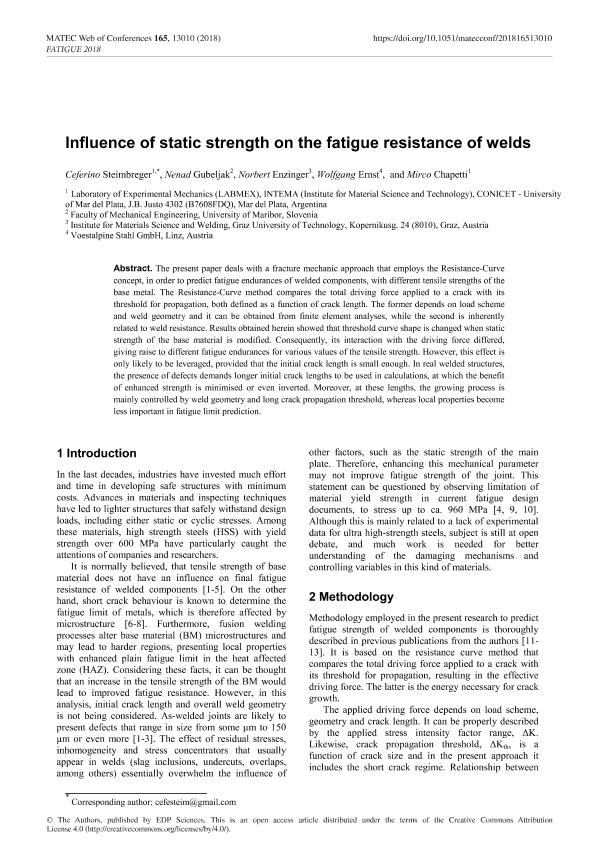Mostrar el registro sencillo del ítem
dc.contributor.author
Steimbreger, Ceferino

dc.contributor.author
Gubeljak, Nenad
dc.contributor.author
Enzinger, Norbert
dc.contributor.author
Ernst, Wolfgang
dc.contributor.author
Chapetti, Mirco Daniel

dc.date.available
2019-12-09T18:57:39Z
dc.date.issued
2018-05-25
dc.identifier.citation
Steimbreger, Ceferino; Gubeljak, Nenad; Enzinger, Norbert; Ernst, Wolfgang; Chapetti, Mirco Daniel; Influence of static strength on the fatigue resistance of welds; EDP Sciences; MATEC Web of Conferences; 165; 25-5-2018; 13010
dc.identifier.issn
2261-236X
dc.identifier.uri
http://hdl.handle.net/11336/91755
dc.description.abstract
The present paper deals with a fracture mechanic approach that employs the Resistance-Curve concept, in order to predict fatigue endurances of welded components, with different tensile strengths of the base metal. The Resistance-Curve method compares the total driving force applied to a crack with its threshold for propagation, both defined as a function of crack length. The former depends on load scheme and weld geometry and it can be obtained from finite element analyses, while the second is inherently related to weld resistance. Results obtained herein showed that threshold curve shape is changed when static strength of the base material is modified. Consequently, its interaction with the driving force differed, giving raise to different fatigue endurances for various values of the tensile strength. However, this effect is only likely to be leveraged, provided that the initial crack length is small enough. In real welded structures, the presence of defects demands longer initial crack lengths to be used in calculations, at which the benefit of enhanced strength is minimised or even inverted. Moreover, at these lengths, the growing process is mainly controlled by weld geometry and long crack propagation threshold, whereas local properties become less important in fatigue limit prediction.
dc.format
application/pdf
dc.language.iso
eng
dc.publisher
EDP Sciences
dc.rights
info:eu-repo/semantics/openAccess
dc.rights.uri
https://creativecommons.org/licenses/by-nc-sa/2.5/ar/
dc.subject
Fatiga
dc.subject
Soldadura
dc.subject.classification
Ingeniería de los Materiales

dc.subject.classification
Ingeniería de los Materiales

dc.subject.classification
INGENIERÍAS Y TECNOLOGÍAS

dc.title
Influence of static strength on the fatigue resistance of welds
dc.type
info:eu-repo/semantics/article
dc.type
info:ar-repo/semantics/artículo
dc.type
info:eu-repo/semantics/publishedVersion
dc.date.updated
2019-10-22T15:43:36Z
dc.journal.volume
165
dc.journal.pagination
13010
dc.journal.pais
Francia

dc.journal.ciudad
Les Ulis
dc.description.fil
Fil: Steimbreger, Ceferino. Consejo Nacional de Investigaciones Científicas y Técnicas. Centro Científico Tecnológico Conicet - Mar del Plata. Instituto de Investigaciones en Ciencia y Tecnología de Materiales. Universidad Nacional de Mar del Plata. Facultad de Ingeniería. Instituto de Investigaciones en Ciencia y Tecnología de Materiales; Argentina
dc.description.fil
Fil: Gubeljak, Nenad. Univerza V Mariboru;
dc.description.fil
Fil: Enzinger, Norbert. Technische Universitat Graz; Austria
dc.description.fil
Fil: Ernst, Wolfgang. Voestalpine Stahl Gmbh; Austria
dc.description.fil
Fil: Chapetti, Mirco Daniel. Consejo Nacional de Investigaciones Científicas y Técnicas. Centro Científico Tecnológico Conicet - Mar del Plata. Instituto de Investigaciones en Ciencia y Tecnología de Materiales. Universidad Nacional de Mar del Plata. Facultad de Ingeniería. Instituto de Investigaciones en Ciencia y Tecnología de Materiales; Argentina
dc.journal.title
MATEC Web of Conferences
dc.relation.alternativeid
info:eu-repo/semantics/altIdentifier/url/https://www.matec-conferences.org/articles/matecconf/abs/2018/24/matecconf_fatigue2018_13010/matecconf_fatigue2018_13010.html
dc.relation.alternativeid
info:eu-repo/semantics/altIdentifier/doi/http://dx.doi.org/10.1051/matecconf/201816513010
Archivos asociados
